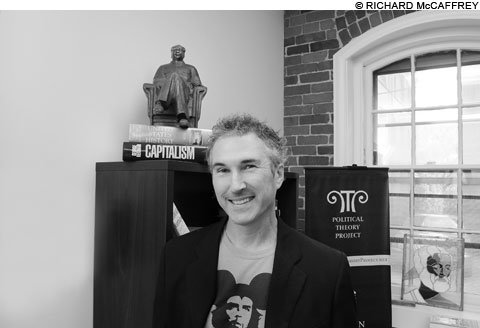
BLEEDING HEART LIBERTARIAN Tomasi. |
Libertarians have been labeled many things, but compassionate isn't one of them.
Brown University Professor John Tomasi's new book, Free Market Fairness, aims to put the heart in what has long been the Tin Man of political philosophy. It's a tall order for an ideology whose most prominent intellectual standard-bearer in the late 20th century, Robert Nozick, was so committed to property rights absolutism that he famously defended a person's right to sell himself into slavery.
Tomasi is hoping that his book will be jarring as well, but perhaps in ways more mind-bending than jaw-dropping. The author — who spent four years writing over pots of tea at the Coffee Depot in Warren — mostly recently pitched his ideas at a centennial birthday party for libertarian hero Milton Friedman, held at Nick-a-Nee's. Afterwards, the Phoenix caught up with him for a Q&A via e-mail.
YOU ARGUE THAT FREE MARKETS AND SOCIAL JUSTICE ARE COMPATIBLE IDEALS—IN OTHER WORDS, THAT THERE IS SUCH A THING AS A "BLEEDING HEART LIBERTARIAN." EXPLAIN HOW THIS IS POSSIBLE. For decades, professors in the academy, like citizens in our society, have been driven into two increasingly stark and irreconcilable camps. On one side we have the self-professed champions of private enterprise and personal responsibility in economic affairs: the libertarians or, on the streets, the Tea Party. On the other side, we have the group marching under the banner of social justice. Presenting themselves as the exclusive champions of the poor and disadvantaged citizens, within the academy these are the social democrats or, on the streets, members of the Occupy Movement. In Free Market Fairness, I seek to break this deadlock. Against the orthodox libertarians, I argue that the government in a free society has an important (albeit carefully limited) role in the provision of social services, provided that those services are provided in a way that does not impinge on the economic liberties held by all citizens. Against the self-professed "progressives," I argue that our social world has fundamentally changed since the early days of the industrial revolution and the requirements of true progressivism have therefore changed fundamentally as well. In current conditions, I suggest, and, provided that the state delivers a set of basic services to needy citizens, free markets embody a particularly attractive kind of fairness.
ISN'T THIS JUST ANOTHER WAY OF BRINGING BACK "COMPASSIONATE CONSERVATISM?" Oh dear, no! I take compassionate conservatism to be a policy initiative. As developed under Presidents Clinton and, especially, George W. Bush, compassionate conservatives argued for the creation of new government agencies charged with distributing government aid monies through faith-based social service agencies. I agree with Clinton and Bush that, if the federal government is going to accept grant proposal requests from social service providers, then it would be wrong to discriminate against aid groups on the basis of religion. However, I view compassionate conservatism as a profoundly outmoded approach to social justice. We best respect our less fortunate fellow citizens when we strive to create a social world that prizes economic initiative with opportunities for people of every class to make something of themselves by their own hard work and according to their own deepest values. More government agencies, in my opinion, is the wrong approach.